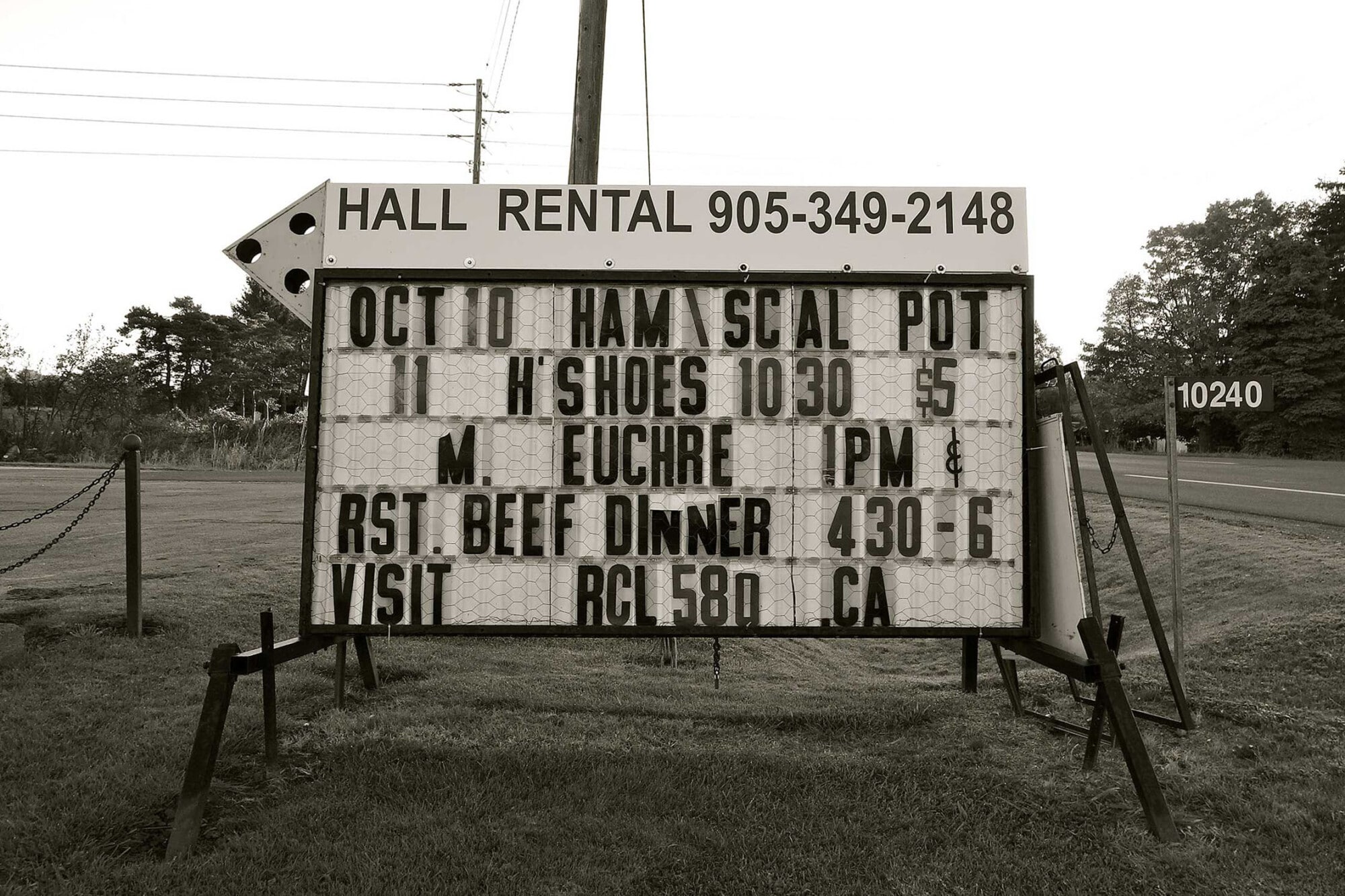Signs of the Time
Applied Arts, December 2014
Mobile billboards and their all-uppercase, badly kerned, scratched plastic letters do have a place in the advertising world

Portable signs. They’re popping up everywhere. You know the ones. They loiter outside gas stations, strip malls and community centres. Their clipped messages hawk everything from 241 SOFT DRINKS to KEEP GRANDMA OFF THE STREET BINGO NIGHTS. The classic rectangular sign typically sits atop a pair of wheels, its white backdrop enabling movable black and red plastic letters to speak freely. The new, sportier models come with deep black façades, trendy fluorescent fonts and hover above slender metal legs. Like pernicious weeds, these mobile billboards are taking over the landscape.
Now I could go on and on about what I don’t like about portable signs — words like ugly or offensive or unsophisticated come to mind. But I’d rather spend the time telling you what I actually like about them. Just so we are clear, I’m talking about the older white signs. Not the new black and fluorescent version — those signs are just showing off.
It’s the messages themselves that I find fascinating; they serve up freedom of speech at its best, and its worst. Think about it for a moment. You can rent your own sign, put it on your property and broadcast pretty much whatever you choose. Hand in hand with this inalienable right goes freedom of expression, freedom of spelling, freedom of grammar and freedom of stupidity. All of which make for some entertaining reading.
Let’s start with freedom of expression. For some strange reason, churches are particularly enamored with spreading the good word using these signs. Who knew religion had such a sense of humour? The Presbyterian Church postulates: THERE ARE SOME QUESTIONS THAT CAN’T BE ANSWERED BY GOOGLE. The Baptist Church, not to be outdone, offers up: WALMART IS NOT THE ONLY SAVING PLACE and CHOOSE THE BREAD OF LIFE OR YOU ARE TOAST. The art of the one-liner is alive and well and working outside places of worship everywhere. But some of these sermonettes are a bit much. Take for instance: A FREE THINKER IS SATAN’S SLAVE or YOU GIVE GOD THE CREDIT – NOW GIVE GOD THE CASH. They don’t sound like the kind of churches you’d want to be a member of. Do they?
Next, spelling mistakes and bad grammar. I’m guessing the restaurant that advertised COFEE & MUFIN was simply running low on the letter F. This directive, found on a small town’s official welcoming sign, says a lot about what lies ahead: ENGLISH IS OUR LANGUAGE NO EXCETIONS – LEARN IT. And why is it that signs at schools have a high incidence for error: WE ARE COMMITTED TO EXCELLENSE and OUR TEACHERS MAKE A DIFFERANCE. If I was giving out grades, I’d give the first one a C and the second one an E.
Then there’s everyone’s favourite: rearranged letters. Who hasn’t wanted to play around with those movable characters? It’s so tempting. Imagine the fun someone had altering the letters of the word SPINE in the following words of wisdom from a chiropractor: LIFE IS GREAT WHEN YOUR SPINE IS STRAIGHT. You’ll get lots of laughs when you remove a couple of letters from this drug store’s sign: CLASS PHOTOS $7.99. Not that all examples have to be rude. A few alterations changed this fast food sign from BUY A CORN DOG – GET A FREE STICK to BUY A CORN DOG – GET FREE TICKS. The car wash special WASH AND WAX $14.99 morphs into something quite different when it becomes HANDSAW WAX $14.99. All are eclipsed by this frustrated sign master’s cry for help: QU!T 5T3AL!NG O R LETT3R$.
The signs that make all of the bad ones easier to stomach are the clever ones. Yes, they are few and far between, but finding one is so rewarding. Take, for instance, the ice cream stand that says, SCREAM UNTIL DADDY STOPS THE CAR or the one next to the law enforcement precinct: POLICE STATION TOILET STOLEN – COPS HAVE NOTHING TO GO ON. And don’t you wish you’d penned: I WAS ADDICTED TO THE HOKEY POKEY BUT I TURNED MYSELF AROUND! Like orange pylons on a highway, these gems stand out.
David Ogilvy, one of the original Mad Men and better known as “The Father of Advertising,” once said, “…If you’re trying to persuade people to do something, or buy something, it seems to me you should use their own language, the language they use every day, the language in which they think.”
I’m not so sure that portable sign messages were what Ogilvy had in mind when he said this. Nonetheless, portable sign language is simple and direct. Although the majority of these communiqués are workaday and forgettable, they do get the word out. And I suppose that’s all we should expect from a gas station announcing a sale on windshield washer fluid. We may all be capable of writing — but that doesn’t make us good advertisers.